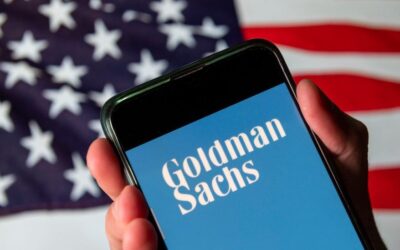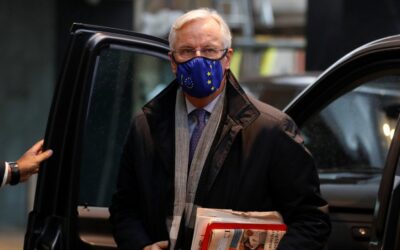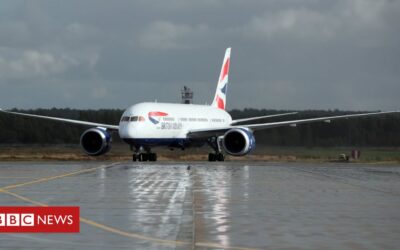image copyrightGetty ImagesNearly one in 10 workers on furlough due to the pandemic have been asked to work by their boss, breaking the scheme’s rules, a National Audit Office survey suggests.This kind of fraud may have cost taxpayers up to £3.9bn, the NAO said.The government defended the scheme as a “lifeline” without which lives would have been ruined during lockdown.But the NAO said it was brought in so rapidly in March that “considerable levels of fraud and error” were likely.Designed to help those who could not work due to lockdown, the Coronavirus Jobs Retention Scheme scheme supported more than 9.6 million workers at its peak. Workers on leave have been paid 80% of their salaries, in full or part by the government, although it will be replaced by a less generous jobs scheme from 1 November. The NAO said that a fraud hotline set up by the tax authorities, HMRC, received over 10,000 reports of contraventions, while its own survey, conducted by Ispos Mori, found 9% of furloughed workers had continued to work at the request of their boss.image copyrightGetty ImagesSome employers had also claimed furlough payments but not passed them on in full to employees, the NAO said.By May about a third of the UK workforce was on furlough, while at least 2.6 million self-employed were also given state support via a separate programme.However, the NAO said as many as 2.9 million people were unable to access any help, “either because of ministerial decisions about where to focus support, or because HMRC did not have data needed to properly guard against the risk of fraud”. ‘Hasty’ furlough scheme ‘left room for fraud’Bad bank loans could cost taxpayer up to £26bnThe civil service had done well to launch the job protection schemes so quickly, said Gareth Davies, head of the NAO, but due to the pace at which they were introduced it had not been able to follow standard procedures.He said the tax office should have done more to prevent fraud including informing employees whether their employer was part of the furlough scheme.”In future, the departments should do more while employment support schemes are running to protect employees and counter acts of fraud,” Mr Davies said.Earlier this month MPs on the Public Accounts Committee also warned that setting up the schemes at such short notice had left “unacceptable room for fraud”.’No apology’The NAO is recommending that any future support schemes should consider how to ensure more people are eligible, if they have suffered loss of income, as well as how to prevent further fraud.The Treasury and HMRC should also focus on assessing fraud and error and recovering overpayments. A government spokesperson said it made “no apology” for the speed at which the schemes were delivered.”The government’s priority from the start of the outbreak has been on protecting jobs and getting support to those who need it as quickly as possible, and our employment support schemes have provided a lifeline to millions of hardworking families across the UK. “Our schemes were designed to minimise fraud from the outset and we have rejected or blocked thousands of fraudulent claims. We will not tolerate those who seek to defraud taxpayers and will take action against perpetrators, including criminal prosecution.”
BBC Business News Articles
Goldman Sachs to pay $3bn over 1MDB corruption scandal
image copyrightGetty ImagesGoldman Sachs has agreed to pay nearly $3bn (£2.3bn) to end a probe of its role in the 1MDB corruption scandal.The bank’s Malaysian subsidiary also admitted in US court that it had paid more than $1bn in bribes to win work raising money for the Malaysian state-owned wealth fund.US officials said the record settlement reflected Goldman’s “central” role in a “massive corruption scheme”.Goldman admitted it had fallen “short”, calling it an “institutional failure”.In all, the investment bank is due to pay about $5bn in penalties – about two thirds of its 2019 profits – to regulators around the world, including in the UK, to resolve cases that have severely tarnished the firm’s reputation.Goldman’s board also said it will recoup or withhold $174m in compensation awarded to executives, including retired boss Lloyd Blankfein, under whose watch the scandal happened.”The board views the 1MDB matter as an institutional failure, inconsistent with the high expectations it has for the firm,” it said in a statement. What was the 1MDB scandal?The 1MDB scheme was a global web of fraud and corruption, in which billions of dollars ostensibly raised for public development projects in Malaysia instead landed in private pockets, including those of the country’s former prime minister Najib Razak. Malaysia ex-PM given 12-year term for corruption Goldman Sachs settles 1MDB with Malaysia for $3.9bnUS targets Monet and Warhol artworks in 1MDB caseAuthorities in Asia, the US and Europe have spent years tracking down cash and assets paid for with money stolen from the Malaysian fund, including property, jewellery and art.image copyrightEPAIn announcing the settlement on Thursday, US Department of Justice officials said Goldman Sachs had enabled a scheme that caused “significant harm”.”That harm was borne principally and in the first instance by the people of Malaysia, who saw a fund created to benefit them… instead turned into a piggybank for corrupt public officials and their cronies,” said Brian Rabbitt, acting assistant attorney general of the Justice Department’s criminal division.In July, Najib was found guilty in Malaysia on all seven counts in the first of several multi-million dollar corruption trials and sentenced to 12 years in jail. He had pleaded not guilty to the charges of criminal breach of trust, money laundering and abuse of power and is appealing the decision.What was Goldman’s role?Probes of Goldman Sachs focused on its help raising $6.5bn in 2012 and 2013 for the fund formally known as 1Malaysia Development Bhd (1MDB), work authorities said earned the firm more than $600m. Goldman had long blamed rogue employees, asserting it had no idea the money it helped raise would be diverted from planned development projects within Malaysia. But on Thursday, the bank admitted that its Malaysian unit had “knowingly and willingly” paid bribes to foreign officials and that it had ignored red flags that should have alerted higher-ups to problems with the deal.image copyrightGetty ImagesIt agreed to return the $600m to Malaysia and pay roughly $2.3bn to regulators in the US, UK, Hong Kong and Singapore.The settlement with the US charged the parent company with bribery violations, but authorities agreed to defer prosecution. That move allows Goldman to avoid a criminal conviction, a black mark that would have forced some clients to end work with the fund.Earlier, one former Goldman Sachs partner, Tim Leissner, pleaded guilty in the US to conspiring to launder money and violating foreign bribery laws. Another executive is awaiting trial on foreign bribery offenses.”We have to acknowledge where our firm fell short,” chief executive David Solomon said. “While many good people worked on these transactions and tried to do the right thing, we recognise that we did not adequately address red flags and scrutinise the representations of certain members of the deal team… as effectively as we should have.” What other settlements have been announced?Three months ago, Goldman Sachs reached a $3.9bn settlement with the Malaysian government for its role in the corruption scandal.The settlement included a $2.5bn cash payout by Goldman, while the investment bank said it would guarantee that the government would receive at least $1.4bn from money recovered from the scheme.The deal resolved charges in Malaysia that Goldman had misled investors.Hong Kong regulators on Thursday said they were due to receive $350m in fines. Goldman has also agreed to pay $126m in penalties in the UK and $122m in penalties in Singapore.
Huawei Mate 40 phones launch despite chip freeze
image copyrightHuaweiHuawei has unveiled its Mate 40 smartphones claiming they feature a more “sophisticated” processor than Apple’s forthcoming iPhones.The component was made using the same “five nanometre” process as its US rival’s chip, but contains billions more transistors.As a result, the Chinese firm claims its phones are more powerful.However, Huawei has had its supply of the chips cut off because of a US trade ban that came into effect in September.That means that once its stockpile of the new Kirin 9000 processors runs out, it faces being unable to make more of the Mate 40 handsets in their current form.At present, only Taiwan’s TSMC and South Korea’s Samsung have the expertise and equipment to manufacture 5nm chips, and both are forbidden to supply Huawei with them or any other semiconductor product whose creation involves “US technology and software”.The States says the move has been taken on national security grounds, but Huawei denies posing a threat.image copyrightHuaweiThe BBC asked how many of the chips Huawei had purchased, but it declined to answer.However, in a online presentation, the company’s consumer devices chief Richard Yu acknowledged the ban was “making the situation extremely difficult for us”.Huawei also faces other earlier restrictions placed on it by Washington, which have prevented any of the devices it has launched since mid-2019 from providing access to some of Google’s services, including its Play Store. Despite this, Huawei remains the world’s third-bestselling smartphone-maker, and the market leader in its home country.”In China, Huawei has phenomenal brand awareness in the premium space,” commented Mo Jia, an analyst at tech research firm Canalys.”Demand for the Mate 40 series is expected to be strong [there], but despite this, amid US sanctions, component constraints may limit the total quantity of new Kirin-powered smartphones Huawei can produce.”Smooth screensThe basic Mate 40 model – which Huawei said costs €899 ($1,049; £800) – has a 6.5in (16.5cm) OLED display. Three more expensive versions – ranging in price up to €2,295 – have 6.8in OLED screens.In each case, the screens offer a 90Hz refresh rate – meaning the equivalent of 90 frames per second – which is higher than Apple’s newest iPhones but less than Samsung’s S20 series. image copyrightHuaweiMr Yu suggested this offered the best balance of smoothness and battery life.One of the main ways the different models are differentiated are by their cameras:the basic Mate 40 has a single selfie camera and three rear cameras (wide-angle, ultra-wide angle and telephoto)the Mate 40 Pro adds a 3D face-unlock sensor, and improves the specifications of the rear ultra-wide and telephoto camerasthe Mate 40 Pro+ adds a fourth rear “super-zoom” camera and a fifth depth-sensing camera for improved shallow-focus shotsthe Porsche Design Mate 40 RS introduces an infrared thermometry sensor, allowing the device to check the local temperatureFor the time being, the firm only plans to put the Pro model on sale outside China, where it will cost £1,100.One of the innovations detailed was the use of a “free-form lens” for the ultra-wide angle camera found on each model, which Huawei said solved image distortion problems.image copyrightHuaweiThe firm added that an optional “eyes-on-device” feature – which only turns on the screen when it detects being looked at – would reduce the power the handset consumes.Absent appsHuawei said the Kirin 9000 chip includes an integrated 5G modem, which enables it to extend battery life beyond its rivals.One slide displayed at the launch claimed the Mate 40 Pro would last about 25% longer on a single charge than Samsung’s Note 20 Ultra+, despite the latter having a bigger battery.image copyrightHuaweiHuawei said it was also using the extra processing power to take slow-motion shots at 240 frames per second from two of the cameras simultaneously.The firm also boasted that the chip allows its devices to offer a “pro-gaming” experience, thanks to its ability to offer graphics with better detail and lighting effects.However, some titles including Call of Duty Mobile will not work on the devices because of their lack of access to some of Google’s technologies, while some others function but are unable to make in-app payments.Most Android apps can be installed via the Petal search tool even if they do not appear in Huawei’s own app store.However, there are notable exceptions. Many banking apps, eBay and the UK’s Tesco Groceries app will not install, and instead the user is provided with an icon that instead launches their websites. The Sky News app is also unavailable, although Huawei said it was coming soon.image copyrightHuawei”Clearly politics has brought about a situation where Huawei is now working hard to become non-reliant upon Google to offer consumers an alternative,” a spokesman told the BBC.”Surely what Huawei is doing with its App Gallery – albeit a work in progress – deserves praise.”If an app is unavailable, users can add it to a “wish list” and Huawei says the developer will be told if there is strong demand.But one expert questioned whether most consumers would be happy with the current arrangement.”The new chip is impressive and the circular camera design on the rear distinctive, but despite Huawei’s best efforts to build up its App Gallery, there are still significant gaps,” commented Ben Wood from CCS Insight.”Even with the Petal search capability, you still have this challenge that you have to find the applications and then side-load them onto the device. That’s all very well for tech-savvy, committed Huawei enthusiasts, but for the mass market, it’s a pretty big barrier to put in people’s way.”
Brexit: Michel Barnier arrives in UK as trade talks restart
image copyrightReutersThe EU’s chief negotiator has warned that time is running out to strike a post-Brexit trade deal, as talks resumed after a week-long standoff. Arriving in London, Michel Barnier said “every day counts,” ahead of face-to-face negotiations with his UK counterpart Lord David Frost.Officials from both sides will hold “intensified” daily talks in the run-up to December’s deadline for a deal. No 10 has warned “significant gaps” remain in the most difficult areas. Negotiations stalled last week after a summit in Brussels where EU leaders called on the UK to “make the necessary moves” towards a deal.But the UK side agreed to resume talks after Mr Barnier said “compromises on both sides” were needed, in a speech on Wednesday. UK ‘ready to welcome EU’ to continue trade talks Trade talks are back on – but what’s changed?What are the sticking points in Brexit trade talks?Both sides are seeking an agreement to govern their trading relationship once the UK’s post-Brexit transition period ends in January 2021.Key areas of disagreement include fishing rights, post-Brexit competition rules and how any deal would be enforced. Arriving in the UK, Mr Barnier told reporters it was “important to be back at the table”, and the two sides shared a “huge common responsibility”.Earlier on Thursday, the prime minister’s official spokesman also acknowledged “time is now very short” for the two sides to reach a deal. Format for talks In line with a demand made by the UK, both sides will resume talks on all subjects based on proposed legal texts prepared by officials. They have also agreed that “nothing is agreed” until progress has been reached in all areas – which has been a key demand of the EU.An “initial phase” of face-to-face talks will run until Sunday, with subsequent negotiations planned in both Brussels and London.These later talks could either take place in person or be held via video link if Covid restrictions apply, if both sides agree. You could be forgiven for thinking that what we’ve witnessed over the past few days is a bit of political theatre.Cover for the government – post chest-beating- to return to the negotiating table where they know the time has now come for tough compromises to be made.EU leaders also went out of their way to sound tough on Brexit at their summit last week. Privately, a number of EU figures now admit it was a misstep.But EU leaders play to the domestic gallery too. They wanted to show they were “standing up to the UK” – that leaving the EU doesn’t pay and that EU interests would be defended. Read more from Katya hereThe two sides have been at odds over the issue of so-called “state aid” rules, which limit government help for industry in the name of ensuring fair economic competition. The UK has rejected an EU demand made earlier in the year for it to continue following the bloc’s rules on such subsidies as part of a trade agreement. Lord Frost has suggested the UK could instead agree “principles” for how subsidies are spent – something welcomed by Mr Barnier on Wednesday. The two sides are also haggling over how much European fishing boats should be able to catch in British waters from next year.The EU has so far resisted UK demands for annual talks to decide stock limits, as well as a reduction in access for its vessels to British fishing grounds. Transition deadline loomsBy remaining in the bloc’s single market and customs union, the UK has continued to follow EU trading rules during its post-Brexit transition period.This 11-month period is due to end in December, and the UK has ruled out seeking an extension.Formal talks began in March and continued throughout the pandemic, initially via video link before in-person discussions resumed over the summer.If a deal is not done, the UK will trade with the EU according to the default rules set by the Geneva-based World Trade Organization.YOUR WORK, YOUR MONEY: Is my bar business better off in Tier 3?WHAT PLANET ARE WE ON: Sir David Attenborough talks about the impact of the pandemic on tackling climate change
Coronavirus: Canary Islands added to UK's safe travel list
image copyrightGetty ImagesUK tourists seeking winter sun have been given a boost, after Spain’s Canary Islands and the Maldives were added to the government’s safe travel list. It means visitors will no longer need to quarantine for 14 days on their return, with the Greek island of Mykonos and Denmark also deemed safe.The changes apply to anyone arriving in the UK after 04:00 BST on Sunday.But Liechtenstein has been taken off the list, so arrivals must isolate. The changes apply to citizens from England, Scotland, Northern Ireland and Wales. Winter sunThe Canary Islands are popular with winter holidaymakers, being one of the few parts of Europe warm enough for beach holidays at that time.However, the rest of Spain, including the Balearic Islands, remain subject to quarantine restrictions amid a surge in infections.Beyond having to fill in passenger locator forms, visitors to the Canaries and Mykonos currently face no restrictions to entry.Which countries can I still go on holiday to?First UK airport coronavirus testing beginsBut all visitors to the Maldives are required to prove they have had a negative Covid test within 96 hours of arrival. Meanwhile, any UK citizen visiting Denmark must prove they have a “worthy purpose” for visiting, such as work or study, as Denmark deems Britain to be a high risk country. Tourism is not considered a “worthy purpose”, although people with second homes in the country may visit. The Department for Transport said the new additions to the safe list had seen a decrease in confirmed cases of coronavirus. However, it said there had been “a significant change in both the level and pace of confirmed cases of coronavirus in Liechtenstein” leading to it being removed from the current list of travel corridors.After so much doom and gloom, travel companies can suddenly see the sunshine. The Canaries are a key destination for UK airlines and tour operators. And it is not an exaggeration to say that the removal of the quarantine will help these companies make it through the winter. The government has, in effect, dialled-up the tourism “on switch”. However it will be a real test case for whether, in these uncertain Covid times, there is demand for travel. With plenty of time for people to make winter bookings it’s a timely moment. British Airways recently scheduled a direct flight to the Maldives, so maybe they knew something we didn’t.Travel companies, which have seen demand slump due to the quarantine rules, welcomed the decision on the Canaries. “The Canaries are a hugely important market for winter travel – representing over 50% of bookings for some tour operators – so this is very welcome news for the whole sector,” said industry body Airlines UK.Andrew Flintham, managing director of TUI, said the holiday operator had not been able to take people on a holiday to the Canaries for 89 days.”We’re therefore delighted that UK flights will now resume from Saturday 24 October. The first flights will depart to Fuerteventura and Lanzarote this weekend, with many more added in the coming days.”There are now only a handful of places travellers from the UK can visit without facing restrictions – either when they arrive at their destination, or return.There are hopes coronavirus testing for passengers could make travel to more destinations possible, by providing proof of a negative result before travellers leave the UK.Transport Secretary Grant Shapps, meanwhile, has said he is “hopeful” a new testing regime for arrivals to Britain can be in place by 1 December, reducing the amount of time people need to spend in quarantine.However, new British Airways boss Sean Doyle last week called for tests for returning Britons before departure, warning the UK would “get left behind” without more radical action.Earlier on Monday the airline cut flight numbers again, saying it would operate fewer planes than planned for the rest of the year as the pandemic continues to hit demand.The Foreign Office still advises British nationals against all but essential international travel due to the pandemic.
Facebook and Twitter chiefs ordered to testify over Biden article
image copyrightReuters/EPAFacebook’s Mark Zuckerberg and Twitter’s Jack Dorsey will be ordered to testify over alleged censorship of a controversial New York Post article. The article revealed emails and photographs that the New York Post claimed were copied from the laptop of Joe Biden’s son, Hunter Biden.Twitter said the story had violated its “hacked materials” policy, but later changed its stance.Facebook had limited its spread in the news feed while it was fact-checked.The move prompted accusations of censorship and pro-Biden bias from Republican lawmakers.Now, 12 Republicans on the Senate Judiciary Committee have voted to compel the two chief executives to testify about their handling of the matter.Ten democrats sat out the session in protest over an earlier vote on Amy Coney Barrett’s Supreme Court nomination. Mr Dorsey and Mr Zuckerberg are already due to appear before the Senate Commerce Committee next week, alongside Google chief executive Sundar Pichai, to give evidence over claims of anti-conservative bias.Republican Senator Ted Cruz, who sits on the Senate Judiciary Committee, tweeted that “big tech CEOs are drunk on power and must be held accountable”.#BigTech CEOs are drunk on power & must be held accountable for interfering in this election. Last week I led calls to subpoena @Twitter & @Facebook’s CEOs to testify before @senjudiciary. Today my colleagues passed that subpoena. We will get answers for the American people.— Ted Cruz (@tedcruz) October 22, 2020
“We will get answers for the American people,” he wrote.No date for a hearing has been set.Controversial limitsThe New York Post’s article focused on an email from a representative of a Ukrainian energy company, sent in April 2015, apparently thanking Hunter Biden for an invite to meet Joe Biden in Washington DC.Joe Biden was vice-president at the time, and his son was on the board of directors for the energy firm.Biden article reignites social media bias claimsBig Tech: Between a rock and a hard placeThere is no evidence that such a meeting ever took place, and previous investigations have never found evidence of wrongdoing by the former vice-president, despite claims form his political opponents.The New York Post article also contained screenshots that showed private email addresses.Twitter was criticised for blocking people from sharing the article. It later said that it had done so because the article violated its policies on publishing private information and “hacked materials”.Mr Dorsey later acknowledged it had not properly communicated its decision. It later changed its “hacked materials” policy.Facebook limited the spread of the article in its news feed, while the piece was fact-checked by third-party organisations.It is unusual for Facebook and Twitter to limit the spread of an article from an established, mainstream news outlet in this way.Political angerThe restrictions, coming in the run-up to the US presidential election on 3 November, fuelled anger from Mr Biden’s political rivals over the alleged censorship of Republicans.President Trump has proposed removing a legal protection from social networks, treating them as publishers if they fact-check or restrict material.Mr Biden has also suggested removing those protections – but for different reasons. He has criticised the spread of misinformation online with little consequences for the companies facilitating it.Democrats voted with their Republican colleagues earlier this month, ordering the bosses of Twitter, Facebook, and Google to face questions.Despite the Democrats’ absence from the vote this time, Republican committee chairman Lindsey Graham said he believed there was “a lot of interest on the other side” in getting “the social media folks here to answer questions”.
New government Covid scheme to pay up to half of wages
image copyrightPA MediaThe chancellor has unveiled increased support for jobs and workers hit by Covid restrictions after growing clamour from firms in tier two areas.Rishi Sunak announced big changes to the Job Support Scheme (JSS) – set to replace furlough in November.He told the Commons that even businesses not forced to shut were facing “profound economic uncertainty”.Under the revised scheme, employers will pay less and staff can work fewer hours before they qualify.At the same time, the taxpayer subsidy has been doubled.At an afternoon news conference, Prime Minister Boris Johnson thanked the chancellor for introducing measures that “will protect people’s livelihoods”.But he warned that the UK would face “many thousands more deaths” if it put the economy before health.Why is this happening?Businesses in tier two areas, particularly in the hospitality sector, had complained that they would be better off if they were under tier three restrictions. They argued that although they would be forced to close, they would benefit from greater government support.One prominent chef, Yotam Ottolenghi, had said conditions for his restaurants were “terrible” since tier two restrictions were applied to London, adding: “We are on our knees now.”In response to such arguments, Mr Sunak has now changed the terms of the JSS. Referring to those businesses, he said: “It is clear that they require further economic support.”How does the new plan work in detail?Instead of a minimum requirement of paying 55% of wages for a third of hours, as announced last month at the launch of the Winter Economic Plan, employers will have to pay for a minimum of 20% of usual hours worked, and 5% of hours not worked. The government will now fund 62% of the wages for hours not worked. This more than doubles the maximum payment to £1,541.75 a month. In the most generous case, the taxpayer will now go from funding 22% of wages to just under half.Will coronavirus mean I have to pay more tax?What will I be paid if work has to close?What Covid tier is my area in?The scheme will, as before, be open to all small businesses and larger businesses that can show an impact on revenues. It is aimed at addressing the gap in support for businesses in tier two restrictions, such as London and Birmingham, but is not explicitly tied to that status, and is available across the UK.Are all small firms pleased?image copyrightNoel HutchinsonNoel Hutchinson, director of Poole-based powerboat experience firm Get Lost Sailing, is one small businessman who is feeling overlooked by the new measures.His firm is in a tier one area and so is not receiving any support, but he is seeing far fewer customers as a result of the virus.”Whether or not businesses are in tier one, two or three, they are all being massively affected by the virus,” he says.”A hospitality and tourism business such as ours depends on out-of-town visitors and these people are no longer travelling. Our bookings have slowed massively.”Mr Hutchinson feels that a national lockdown would serve him better, since any government support would then be distributed across the country.”It would be better for our industry if the whole country was locked down at once and every business in receipt of a fair proportion of the support packages.”How will it work outside England?The scheme is UK-wide. However, the system of tiered restrictions in England, which gave rise to the government’s newly increased economic support, is not.While England has a three-tier system, Scotland is due to bring in a five-tier system of virus alert levels from 2 November.The middle three will be “broadly equivalent” to the English three, but the Scottish system will add an extra tier at the bottom and one at the top.Wales is about to enter a two-week national lockdown from 18:00 BST on Friday, while Northern Ireland began a four-week lockdown last Friday.All the devolved nations have been promised extra central government funding so they can award grants at a local level.What’s the background to this decision?Almost as soon as the heads of the CBI and the TUC appeared on the steps of Number 11 Downing Street to endorse last month’s Winter Economic Plan, there were some doubts about its effectiveness. Business and union leaders were happy that some support for part-time working had been announced – itself a revolution for the UK – but the levels of support fell well short of German-style schemes. In particular, employers faced a hurdle of having to pay at least half of workers’ wages. This was not a bug in the system – it was the strategy. The Treasury wanted the scheme to lean into a process of economic restructuring to a post-Covid “new normal” and not seek to prevent those changes.But all that was predicated on the pandemic being on the wane and the recovery assured. That has not proven to be the case, and indeed some had spotted that, even at the time of the original plan. This is an acknowledgement of gaps in that scheme and that large swathes of the economy are in survival, not restructure mode.For the chancellor, this is a sign that he will offer the right support at the right time. Others will say that the data was going in this direction a month ago, and that some jobs have unnecessarily been lost. Hospitality businesses gathered at a south London pizza restaurant also told the chancellor of their need for help with rents from landlords – something the Treasury thinks is far more tricky than, for example, mortgage holidays. In Greater Manchester, they will wonder why this wasn’t offered to areas that were under strong social restrictions earlier. But this is a significant package worth several billion pounds, recognising the economy clearly needs support now before some inevitable fundamental changes.How did it play out politically?”I’ve always said that we must be ready to adapt our financial support as the situation evolves, and that is what we are doing today. These changes mean that our support will reach many more people and protect many more jobs,” Mr Sunak said.”I know that the introduction of further restrictions has left many people worried for themselves, their families and communities. I hope the government’s stepped-up support can be part of the country pulling together in the coming months.” Responding to his statement, shadow chancellor Anneliese Dodds criticised the government for what she said was a “patchwork of poor ideas, rushed out at the last minute”.She said its approach to support for areas entering tier three had been “nothing short of shambolic”.In other political reaction, Greater Manchester mayor Andy Burnham tweeted that the new measures had not been “put on the table” during negotiations with the government this week that failed to agree a £65m package of support.”Honestly, can barely believe what I’m reading here,” he said.Honestly, can barely believe what I’m reading here. ?Why on earth was this not put on the table on Tuesday to reach an agreement with us?I said directly to the PM that a deal was there to be done if it took into account the effects on GM businesses of three months in Tier 2. https://t.co/w2AeeLitGP— Andy Burnham (@AndyBurnhamGM) October 22, 2020
Were there any other new measures?The chancellor also announced specific help for hospitality and leisure businesses in tier two areas. English councils will be funded to give monthly grants of up to £2,100 to 150,000 hotels, restaurants and B&Bs. Devolved nations will be given the equivalent funding for other nations, under the Barnett Formula.The generosity of the self-employment scheme has also been doubled from 20% to 40% of profits, with a maximum grant now of £3,750 over a three-month period.What help are the self-employed getting from government?Can your finances cope?Furlough and redundancy are cutting incomes – and millions of people’s finances are not in a position to cope.Some 12 million people in UK have low financial resilience – meaning they find it hard to pay bills or make loan repayments, according to research by the City regulator, the Financial Conduct Authority.It found that those from a black and minority ethnic background have been more likely than most to be affected by Covid-related falls in income, with 37% of those surveyed taking a hit.Also, people aged between 25 and 34 were the most likely, by far, to have had a change in employment as a result of the pandemic.That has led thousands of people to take payment “holidays” – deferrals on household bills such as rent or energy bills.From 31 October, anyone who arranges a break on repayments of mortgages, loans and credit cards will see their credit record marked – potentially making it harder to borrow more from then on.Payment holidays: ‘I can’t afford to be out of work’What have other people said?Business leaders welcomed the changes, with the CBI employers’ group calling it a “big step towards a more standardised approach”.UK Hospitality chief executive Kate Nicholls described it as “a hugely generous package of support and very welcome news just when we needed it”. She said the changes to the scheme would “help to safeguard hundreds of thousands of jobs” and give firms “a much-enhanced chance of being able to overcome the challenges and survive into 2021”.Adam Marshall from the British Chambers of Commerce said it was a “significant improvement” for many struggling businesses.But he added: “The true test of these reforms will be whether they help businesses on the ground get through the difficult months ahead.”Torsten Bell, head of the Resolution Foundation think tank, which works to improve the standard of living of low-paid workers, said Mr Sunak had done the right thing by expanding help for companies.”Doing it earlier, given the obvious flaws, would have saved more jobs, but at least we’ve got to the right place 10 days ahead of the Job Support Scheme coming into effect,” he said.
Viagogo may have to sell all or part of StubHub, regulator says
image copyrightGetty ImagesTicketing site Viagogo may need to sell all or part of StubHub after an investigation by the UK’s competition watchdog found the merger of the two firms could lead to higher fees.The Competition and Markets Authority (CMA) said the deal would reduce competition as the two firms have a combined market share of more than 90%.Viagogo bought StubHub in February for $4.1bn (£3.1bn).Viagogo said it would work with the CMA to find a solution.The CMA’s findings are from its provisional report. Its final report is due in December.”The evidence we’ve seen so far consistently points in the same direction – that Viagogo and StubHub have a market share of more than 90% combined and compete closely with each other,” said Stuart McIntosh, chairman of the CMA inquiry group.”We are therefore concerned that their merger could lead to secondary ticketing customers facing higher fees and lower quality services.The CMA said its concerns would be addressed by a full sale of StubHub, while a partial sale would have to include “at least the assets and operations of either StubHub or Viagogo that cover the relevant market – the supply of uncapped secondary ticketing platform services for the resale of tickets to UK events”.image copyrightGetty ImagesThe watchdog added: “The CMA is mindful of the significant impact that the coronavirus (Covid-19) is currently having on the live events industry.”However, the evidence is that Viagogo and StubHub would remain important competitors for the foreseeable future without the merger.”A spokesperson for Viagogo said: “Whilst we disagree with the provisional conclusion that the deal would reduce competition, we look forward to working with the CMA to deliver a comprehensive solution which addresses their concerns.”Refund rowThis is not the first time Viagogo has come under the eye of the competition watchdog.Last year, Viagogo dodged CMA legal action after improving what it tells customers about tickets, including seating information and whether the venue had banned ticket resales.The CMA welcomed the changes but criticised the site’s slowness to respond.This summer, Viagogo was criticised for refusing to give refunds to people who had bought tickets on its site to events hit by the coronavirus pandemic.Consumer organisation Which? said the ticketing site had added a clause to its cancellation policy which had left some customers unable to claim their money back.But Viagogo said the claim was “fundamentally inaccurate” since their policy on refunding customers had not changed.
Quibi: 'Snackable' video app to close after six months
image copyrightQuibiThe mobile-focused streaming service Quibi has announced it will close just six months after its launch, after failing to attract enough subscribers.The platform offered “quick bites” of video and had lined up big Hollywood stars to appear in some of its shows.But the company said launching its service during the coronavirus pandemic had brought “unprecedented challenges”.It will now seek to sell its technology platform and the rights to some of its original content.Quibi was set up by former Walt Disney Studios chairman Jeffrey Katzenberg, and Meg Whitman, former chief executive of Hewlett Packard Enterprise.When it was launched in the US in April, the company had raised $1.8bn (£1.37bn) from investors and hoped to rival Netflix and YouTube.the news of @quibi’s demise has reminded me of this (unintentionally?) hilarious film about a woman obsessed with her golden arm, starring Rachel Brosnahan pic.twitter.com/53qgUE0fxk— Chris Fox (@thisisFoxx) October 22, 2020
Its programmes were 10 minutes or shorter, with films broken into segments.A key selling point was that videos were produced in both a vertical and horizontal format, and the app would automatically switch between them when the viewer turned their smartphone.BBC Global News produced a daily news programme for the platform, one of several broadcasters paid to make content for Quibi.BBC Studios, the organisation’s commercial arm, and rival broadcaster ITV, had both invested in the platform.”Quibi is not succeeding. Likely for one of two reasons: because the idea itself wasn’t strong enough to justify a standalone streaming service or because of our timing,” Quibi said in a blog post.”The circumstances of launching during a pandemic is something we could have never imagined.”Critics of the service said its short content, designed to be watched by commuters or during a lunch break, had been launched at a time when millions more people were working from home.But one analyst suggested the platform would have struggled regardless of the pandemic.”The pandemic gives them a good excuse for their failure, but I think the real problem was that the idea of episodic content in five-minute chunks isn’t what people are looking for on their smartphone: they want the six second dance moves on TikTok or an influencer video on YouTube or Instagram,” said Jim Nail, principal analyst at the consultancy Forrester.
British Airways owner IAG cuts flight numbers again
Related Topics










